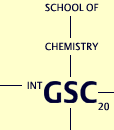 |


![]()
Name: Fang Ge
Diploma / M.Sc degree: Northwest University, China
(June 2010)
PhD Project: New aspects of carboboration and related electrophilic organoboron chemistry
Abstract of Research Project
1,1-Carboboration reactions have been explored intensively in recent years. It is shown to have a great reactivity to cleave C-C= bond, Si-C= bond, P-C= bond and form a new C-C bond , Si-C bond and P-C bond by reacting R-B(C6F5)2 (R = H, Me, Ph, C6F5) with substituted dialkynes or alkyne. 1,1-Carboboration yields novel alkenyl boranes which have been employed in metal catalyzed cross-coupling reactions.
We now want to extend this work to the activation of B-C= bonds by treatment of substituted dialkynyl boranes or substituted alkynyl boranes with R-B(C6F5)2 (R = H, Me, Ph, C6F5). Attempts to prepare boroles from 1,1-carboboration between R-B(C6F5)2 (R = H, Me, Ph, C6F5) and substituted dialkynyl boranes may have an application potential. Such kinds of boroles are electron-deficient building blocks for electron transporting (n-type) materials. In addition, these antiaromatic boroles can split molecular H2 without use of transition-metal catalysts. Furthermore, we also try to get alkenyl boranes by treatment of substituted alkynyl boranes with R-B(C6F5)2 (R = H,, Me, Ph, C6F5).
Publications
F. Ge, G. Kehr, C. G. Daniliuc, G. Erker
Borole Formation by 1,1-Carboboration
J. Am. Chem. Soc. 136 (2014), 68-71.
F. Ge, G. Kehr, C. G. Daniliuc, G. Erker
Unusual Pathway Taken in the Reaction of Bis(alkynyl)diisopropylaminoboranes with B(C6F5)3
Chem. Asian J. 8 (2013), 2227–2234.